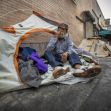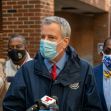When coronavirus forced most schools across the country to shut down, nearly all of them made rapid plans to convert from in-person learning to virtual. Kids with internet access still missed out on many important schoolroom features, but kids without internet access missed out on everything. A new settlement with New York City will make sure that schoolchildren living in homeless shelters are no longer excluded from the classroom. They will now get access to wi-fi so they can attend the same virtual classes as their more-connected peers.
In New York City, approximately 114,000 school-age children, or one in every ten who attend public schools, reside in homeless shelters, and most of them have no wireless internet access. Their parents and the Coalition for the Homeless, the nation’s oldest advocacy and direct homeless service organization, brought a class-action lawsuit against the City in November 2020 to force a rapid change. The suit alleged that the City violated the students’ rights under state and federal law as well as their constitutional rights to a sound, basic education. On April 5, the parties settled, and new deadlines should lead to improved internet access in time for the new school year.
The lack of access to Wi-Fi, which has always hindered top-quality learning, escalated tremendously when NYC Mayor Bill de Blasio ordered the City’s schools to close in response to the COVID-19 pandemic. Over a million children were affected. Those living in homeless shelters were arguably affected the most. They were totally deprived of the chance to further their education.
The New York Department of Education (DOE) came up with a solution. It decided to provide iPads with cellular access to any student who lacked the internet. Soon, unreliable or non-existent cellular service from T-Mobile debunked that idea. The City then switched to Verizon, but the trouble persisted for many. At this point, the City began making plans to install Wi-Fi in all shelters. They said, however, installation could not be accomplished until the summer of 2021.
The City surveyed parents and sent technical assistance whenever connectivity problems were reported. They also offered enrollment in a program that would provide free internet access at designated sites. Problems persisted and The Coalition for the Homeless, the law firm Milbank and the Legal Aid Society sent a letter to the DOE on October 8. This did not speed things up.
A lawsuit, E.G. v. City of New York, was then filed on November 24, 2020. The lead plaintiff lived in a homeless shelter that was located in a cellular dead zone. She had three school-aged children who were unable to attend remote classes because DOE-provided tablets were unable to connect.
Attorneys for this mother and members of her class argued that New York State Education Law, Section 3209, "incorporates the requirements of the McKinney-Vento Act… (and) sets forth the provisions for the education of homeless children within the state."
The New York law, which corresponds to the federal law titled McKinney-Vento, specifically states that "public welfare officials, except as otherwise provided by law, shall furnish indigent children with suitable clothing, shoes, books, food, transportation and other necessaries to enable them to attend upon instruction as required by law." The McKinney-Vento Act, reauthorized in December 2015, is the main federal law relating to the education of homeless children and youth. Among other features of the law, it created the Education for Homeless and Youth Program.
Defendants did not argue they lacked a duty to support the needs of children in homeless shelters. But they argued that they did not violate any state or federal laws because plaintiffs failed to “point to anything that could plausibly be interpreted to require (them) to install Wi-Fi in all shelters, let alone do so in a severely appreciated timeframe.” They argued they were complying in other, multiple ways and said that a requirement to install Wi-Fi at over 200 shelters in 30 days “strains credulity.”
In a December 30, 2020 opinion, regarding a motion for a preliminary injunction seeking expedited discovery and an evidentiary hearing, United States District Judge Alison J. Nathan for the Southern District of New York, said that plaintiffs “adequately pleaded that transitioning to remote learning without providing homeless students reliable means to access the internet created the kind of barriers…contemplated in the statute.”
Settlement talks followed. The April 5 agreement sets strict deadlines for the DOE, which must now install working internet in all homeless shelters by August 31, in time for the new school year. They must quickly switch equipment where needed and must use signage and leaflets in multiple languages to inform residents of their rights. Those who manage shelters must provide every new and current resident with a fact sheet about obtaining internet access, and they must discuss the status of the internet with residents, during regularly scheduled meetings. Failure to comply will put the City in violation of a court order.
Grant Mainland, who headed up a seven-member team at Milbank, said that plaintiffs were “comfortable’ with the settlement because 75% of the shelters were already wired.
In a press conference the following day, de Blasio said, "We have all agreed from the beginning we want every shelter to have full Wi-Fi capacity ... We just want to get this done as quickly as possible even though we understand there's some challenging logistics, we will get the job done."
While definitive data is lacking about the success of distance education, Chalkbeat, an educational reporting blog, writes that existing research shows it leaves much to be desired. Despite “Herculean efforts” by teachers, parents, and school administrators to provide meaningful distance learning, online students are less engaged and more bored. But they, at least, have a chance. Now, thanks to the recent settlement, kids in New York City will get the same chance, too.






